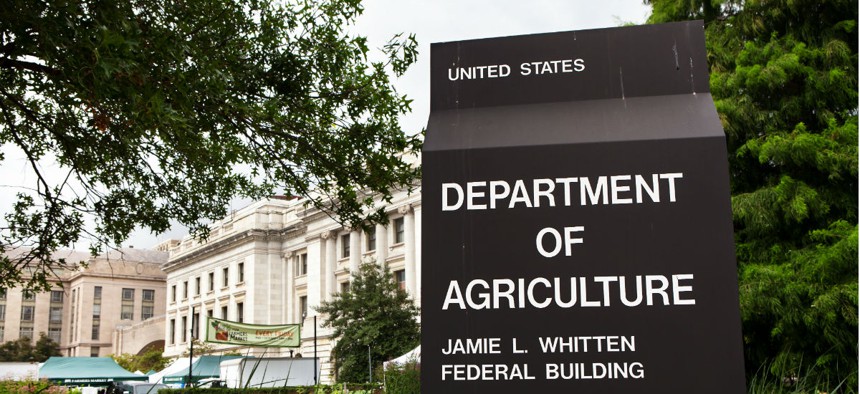
USDA headquarters in Washington. Mark Van Scyoc/Shutterstock.com
Agriculture Secretary Narrows Sites for Office Moves that Democrats Oppose
Criteria include quality of life, cost and logistics for moving researchers out of Washington.
Proceeding apace with his controversial plan to move two research offices out of Washington, D.C., Agriculture Secretary Sonny Perdue on Dec. 21 announced the criteria that will be used to narrow the 136 bids from state, local, academic and industry stakeholders to host the offices.
He seeks to move most of the 700 employees of the Economic Research Service and the National Institute of Food and Agriculture as way to boost recruitment from farm regions and reduce employees’ cost of living.
“We don’t undertake these relocations lightly, and we are doing it to improve performance and the services these agencies provide,” Perdue in a statement. “We will be saving money for the taxpayers and improving our ability to retain more employees in the long run. And we are increasing the probability of attracting highly-qualified staff with training and interests in agriculture, many of whom come from land-grant universities.”
The “guiding principles” the department announced on Friday include locations meeting USDA travel requirements, locations with specific labor force statistics, and locations with work hours most compatible with all USDA office schedules. Perdue has engaged Ernst and Young to help with the selection.
The entities that responded to a Federal Register solicitation address quality of life, which includes formal measures such as the diversity index, residential housing costs, access to healthcare, and home and community safety ranking.
A second criteria is costs, such as capital and operating costs, commercial real estate, land, and the wage growth rate.
A third will be the workforce, including measures of the labor force growth rate, unemployment rate, and the labor population.
And a fourth criteria will be logistics and information technology infrastructure, including lodging availability, proximity to stakeholders, and travel time to Washington.
Meanwhile, following lobbying and criticism from a coalition of research groups led by the American Statistical Association, Rep. Chellie Pingree, D-Maine, on Dec. 19 introduced—in the final days of the 115th Congress, just after Congress passed the massive farm bill—a bill to block the planned office moves. The 2018 Agricultural Research Integrity Act (H.R. 7330) would also keep the Economic Research Service under the undersecretary, where supporters say it is more independent of pressure from the Office of the Secretary, where Perdue intends to move it on the organization chart.
Critics of the move—who fear a brain drain of expertise and new impediments to research interests meeting with multiple stakeholders in the nation’s capital—applauded the bill.
“The nation’s capital and the current organization alignment best position these two agencies to support American food, agriculture and rural communities through research, analysis and statistics,” said Ron Wasserstein, the association’s executive director. He acknowledged that action is more likely to be left for the coming new Congress.







